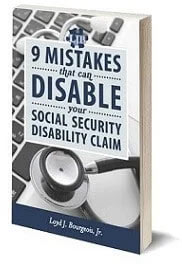What is Long Covid?
Most people who battle COVID-19 experienced mild to moderate symptoms. Some are completely asymptomatic.
However I've seen firsthand as a Louisiana Social Security disability lawyer, not everyone is so fortunate. For some people after an initial, acute case of COVID, additional health complications arise and persist for months and linger for years.
In these cases, the COVID virus is no longer active in their body and cannot be transmitted to others, yet they may be debilitated all the same. This has come to be known as post-COVID syndrome or, more commonly, long COVID.
People with long covid have come to be referred to as "long haulers."
People with long Covid "were less likely to be employed full time and more likely to be unemployed due to the presence of cognitive symptoms" according to a study by JAMA.
Can I Receive Social Security Disability Benefits for Long-Covid?
Long-Covid can cause symptoms and restrictions that can impact your ability to work, and you may qualify for social security disability benefits.
If you are not engaging in gainful activity due to the effects of long covid, the Social Security Administration must determine if you have a medical impairment that is “severe.” This is step 2 of the Sequential Evaluation Process.
An impairment, or combination of impairments, is “severe” according to SSA if it significantly limits your ability to perform basic work activities and will last at least 12 months or result in death.
At step 3 of the evaluation process, the SSA determines if your condition meets a listing. There is currently no listing for post-COVID syndrome in SSA's Listing of Impairments.
Next, the SSA evaluates your ability to do work. They call this your residual functional capacity.
Examples of work-related functions include:
Physical functions: The ability to walk, stand, sit, lift, push, pull, reach, carry, and handle.
Mental functions: The ability to understand, remember, and carry out simple instructions; the ability to use appropriate judgment; and the ability to respond appropriately to supervision, co-workers, and usual work situations, including changes in a routine work setting.
The lower your RFC, the less the Social Security Administration believes you can do. In determining your RFC, the SSA should consider all symptoms substantially limit your ability to function.
You should report all of your symptoms and medical conditions to all of your doctors at every visit.
According to the SSA, examples of Long-COVID symptoms include:
- Difficulty breathing or shortness of breath;
- Cough or abnormal auscultation of the lungs;
- Fever;
- Heart palpitations or other cardiovascular abnormalities;
- Coagulopathy;
- Orthostatic intolerance (symptoms worsen on maintaining upright posture and improve by lying down);
- Weight loss or malnutrition;
- Edema;
- Newly developed diabetes or abnormalities in serum glucose.
- Persistent or relapsing fatigue resulting in reduction or impairment in the ability to carry out daily or work-related activities;
- Post-exertional malaise (worsening of symptoms after physical, cognitive, or emotional effort);
- Exercise intolerance;
- Respiratory difficulties, such as labored breathing or sudden breathlessness;
- Muscle or joint pain or tenderness;
- Weakness;
- Chest tightness, pain, or tenderness;
- Cognitive impairment(s) such as having difficulty with information processing, memory, or concentration and attention (brain fog);
- Headaches of a new type, pattern, or severity;
- Changes in taste or smell;
- Gastrointestinal disturbances, discomfort, diarrhea, or constipation;
- Dizziness when standing up;
- Paresthesia (numbness, tingling, or pins-and-needles sensation);
- Sleep problems;
- Tinnitus;
- Mood changes and new or worsening depression or anxiety.
Long-Covid qualifies for disability benefits when a collection of your symptoms reaches a level of severity that prevents your ability to work.
Tips to Apply for Social Security Disability Insurance (SSDI) For Long Covid
- Ensure that your medical records contain one of the following:
- A positive test for SAR-CoV-2
- A diagnosis of COVID-19 with symptoms of COVID-19
- A diagnostic test consistent with COVID-19 such as a chest x-ray - Make sure your medical records document ALL of your symptoms and limitations. Let your doctor how often you feel the symptoms, how severe each episode is, and how long each episode lasts. Make sure that all your medical problems are adequately documented by your doctor, and that you are receiving the appropriate medical attention for all of your disabling symptoms. Make sure any side effects of medication are noted in your records.
- See a specialist. Treatment by a pulmonologist or other specialists will carry more weight than the same diagnosis from a family physician or internist professional.
- Comply with your doctor’s orders and try various modes of conservative or less invasive treatment, if recommended.
- See a mental health professional. If you are suffering from depression or anxiety as a result of chronic problems and inability to participate in life, see a mental health professional to diagnose, treat, and document these conditions.
- See your doctor regularly and keep your appointments.
- If you can, provide evidence of a long work history.
- Provide examples of unsuccessful attempts to return to work and/or unsuccessful attempts to work in a decreased capacity.
- Include information from non-medical sources to support your disability claims. Gather Information from neighbors, friends, relatives, clergy, and/or past employers about your impairments and how they affect your function. Have them document changes that they have seen in your ability over time. These are not given nearly as much weight as testimony from a medical professional, but they don’t hurt.
- Keep a journal. Make regular notes about your impairment, level of function, and treatments.
- If you need assistance with your claim, contact an attorney who specializes in Social Security Disability.







